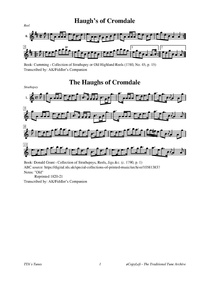Template:Pagina principale/Vetrina: Difference between revisions
No edit summary |
No edit summary |
||
| Line 1: | Line 1: | ||
{{SheetMusic | {{SheetMusic | ||
|f_track= | |f_track=The Haughs of Cromdale.mp3 | ||
|f_pdf= | |f_pdf=Haughs of Cromdale.pdf | ||
|f_artwork= | |f_artwork=Sir_John_Watson_Gordon_-_James_Hogg,_1770_-_1835._Poet;_'The_Ettrick_Shepherd'_-_Google_Art_Project.jpg | ||
|f_tune_name= | |f_tune_name=Haughs of Cromdale | ||
|f_track_title= | |f_track_title=Haughs_of_Cromdale_(The) | ||
|f_section=abc | |f_section=abc | ||
|f_played_by=[https:// | |f_played_by=[https://soundcloud.com/queens-own-highlanders Queen's Own Highlanders] | ||
|f_notes= | |f_notes=James Hogg (1770 – 21 November 1835) - Portrait, 1830. | ||
|f_caption=The | |f_caption=The Grants, M'Kenzies, and M'Cays,{{break}} | ||
|f_source=[https:// | Soon as Montrose, they did espy,{{break}} | ||
They turn'd and fought most manfully,{{break}} | |||
Upon the haughs of Cromdale.{{break}} | |||
|f_source=[https://soundcloud.com/queens-own-highlanders/the-haughs-of-cromdale-medley Soundcloud] | |||
|f_pix=420 | |f_pix=420 | ||
|f_picpix=200 | |f_picpix=200 | ||
|f_article=[[ | |f_article=[[Haughs_of_Cromdale_(The) | '''Haughs of Cromdale''']] | ||
'Haughs' are the low-lying ground along a river, in this case near Cromdale in Speyside. Fiddler-composer [[biography:Donald Grant]] (c. 1760-1830's) of Elgin published an early instance of the tune giving it pride of place as the first tune in his c. 1790 collection, dedicated to Mrs. Col. Grant of Castle Grant. | |||
It includes the epigram: | |||
<blockquote> | |||
''The Grants, M'Kenzies, and M'Cays,''<br> | |||
''Soon as Montrose, they did espy,''<br> | |||
''They turn'd and fought most manfully,''<br> | |||
''Upon the haughs of Cromdale.''<br> | |||
</blockquote> | |||
Grant the composer noted that the tune was "Old" in his day. He references the battle at the Haughs of Cromdale on April 30 and May 1, 1690, following the Battle of Killiecrankie (1689), a defeat for the Jacobites who were led by Major-General Thomas Buchan. | |||
The government forces under Sir Thomas Livingston, commander of the garrison at Inverness, were the victors. [[wikipedia:James Hogg|James Hogg]], the ‘Ettrick shepherd’, later collected a popular song about the defeat, published in his book '''Jacobite Relics of Scotland''' (1817). | |||
The song, however, is historically inaccurate and conflates two battles (Auldearn and Cromdale) separated by some 45 years<ref>Donald Grant may have been familiar with the song prior to the publication of it by Hogg, or, the epigram in Grant's volume may have been added for the 1820-21 edition. | |||
Montrose, whom he mentions in the epigram, was James Graham, 1st Marquess of Montrose, who was hanged in Edinburgh in 1650 after his defeat at the Battle of Carbisdale. | |||
The | The song confuses him with a later Graham, ‘Bonnie Dundee’, who himself had died in 1689 at Killiecrankie. </ref>. | ||
}} | }} | ||
Revision as of 14:38, 28 March 2024

Soon as Montrose, they did espy,
They turn'd and fought most manfully,
Upon the haughs of Cromdale.
Played by: Queen's Own Highlanders
Source: Soundcloud
Image: James Hogg (1770 – 21 November 1835) - Portrait, 1830.

'Haughs' are the low-lying ground along a river, in this case near Cromdale in Speyside. Fiddler-composer biography:Donald Grant (c. 1760-1830's) of Elgin published an early instance of the tune giving it pride of place as the first tune in his c. 1790 collection, dedicated to Mrs. Col. Grant of Castle Grant.
It includes the epigram:
The Grants, M'Kenzies, and M'Cays,
Soon as Montrose, they did espy,
They turn'd and fought most manfully,
Upon the haughs of Cromdale.
Grant the composer noted that the tune was "Old" in his day. He references the battle at the Haughs of Cromdale on April 30 and May 1, 1690, following the Battle of Killiecrankie (1689), a defeat for the Jacobites who were led by Major-General Thomas Buchan.
The government forces under Sir Thomas Livingston, commander of the garrison at Inverness, were the victors. James Hogg, the ‘Ettrick shepherd’, later collected a popular song about the defeat, published in his book Jacobite Relics of Scotland (1817).
The song, however, is historically inaccurate and conflates two battles (Auldearn and Cromdale) separated by some 45 years[1].
...more at: Haughs of Cromdale - full Score(s) and Annotations
X:1 T:Haugh's of Cromdale M:C| L:1/8 R:Reel B:Cumming - Collection of Strathspey or Old Highland Reels (1780, No. 45, p. 15) Z:AK/Fiddler's Companion K:Amix V:1 clef=treble name="0." [V:1] f|eA A/A/A e>dB>d|e>AA>B GABd|eA A/A/A ed Bd|egdB A2A2:| |:f|edeg abTag|egdB dedB|edeg abag|1 egdB A2 A>B:|2 edgB A2A|]
- ↑ Donald Grant may have been familiar with the song prior to the publication of it by Hogg, or, the epigram in Grant's volume may have been added for the 1820-21 edition. Montrose, whom he mentions in the epigram, was James Graham, 1st Marquess of Montrose, who was hanged in Edinburgh in 1650 after his defeat at the Battle of Carbisdale. The song confuses him with a later Graham, ‘Bonnie Dundee’, who himself had died in 1689 at Killiecrankie.
